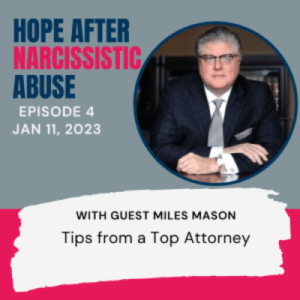Divorcing a Narcissist: Effective Communication With Your Family Law Attorney
Should I get a lawyer when divorcing a narcissist? How do you expose a narcissist in Family court? How do you outsmart a narcissist in a divorce?
Miles Mason, Sr. guests on the new podcast by Amy Helms, Hope After Narcissistic Abuse, Jan. 11, 2023. Mason’s podcast episode link: Financial Abuse During Divorce. Podcast platforms include Apple, Spotify, Google, and others.
Amy Helms:
How can people best communicate with you to make it more efficient and where they’re using your time wisely? And does that make sense?
Miles Mason:
Yes. But here’s the thing, and I may be unique in this, I want my client to tell me everything they think is important because it almost always is. It may not be that important right that minute, but it almost always comes back to being important. And if it’s important to them, it needs to be important to me. So, I’ll get stories that don’t impact the settlement all day long, but it gives me tremendous insight into the opposing party. And with that insight, it helps me craft a negotiation strategy. Let me give you a concrete example. Let’s say my client is describing Lucy. And the other spouse is like Lucy with a football. And when Charlie Brown comes to kick it, she moves it.
Or what you’ve always heard in family therapy, that one spouse is always moving the goalpost. Here’s the goal. And I meet the goal, and then the goal moves. So, if you get a person like that, it may be beneficial to play some of the exact same games. We call that mirroring their tactics. And just let them know that we’re not going to get frustrated, we’re not going to get impatient, we’re not going to be emotionally destabilized, which is the goal of most negative negotiating tactics. So, we want to react to anything done with as few words as possible. So, where I’m going with that is when representing a spouse divorcing a true, true narcissist, we need to spend that time together.
No detail is too small. Because when we craft as lawyers, when we craft our recommendation, many times it’s about the emotional aspects of the divorce, much more than the financial. Because it is, especially with narcissists, much more of an emotional transaction than it is a financial one. And so, to some extent, we’re in a game, so we might as well play it well. And the best way an experienced family lawyer can help a client is to know those boring details, to listen, hear the stories. Now, in terms of methods of communicating, one of my favorite tools is written, because I’m a visual learner, and most male lawyers are visual learners. And that’s how they teach you in law school. You read, you go to class, you talk about what you read, and then you hand write notes. And so, all your thoughts are translated into words.
Same thing in the courtroom. To be an effective trial lawyer, you’d have to be able to think, write, and speak about three different topics at one time. But two of those are visual. So, my point is I love to have my clients write detailed narratives telling me what happened, how they thought about it, and how they thought their spouse thought about it, and what any other witnesses thought about it. And then I can, over a cigar, read that at my leisure and know what I’m going to do. And I don’t care if it’s 35 pages, single-spaced words, I’m going to read every word of it. And I’m going to highlight what’s important for me to follow up with the client about. Because how they felt about a particular problem could be just as important as the problem itself, which is key to therapy and counseling.
And 10 of the points that I come up with, “Oh, you need to tell your therapist about this because this was awful.” And that’s what I think gets lost the most in all the discussions about narcissistic abuse and financial abuse. A lot of times, it is horrific. It could be something as simple as, “Well, I need to go to Birmingham for my aunt’s funeral.” “Well, no, it’s not in the budget.” “What do you mean it’s not in the budget?” “Well, it’s not in the budget for gas, so you can’t go.” No. What if that’s your mother’s closest sibling ever? You’ve got to be there. So, when we talk about financial abuse, when we talk about emotional abuse, it usually turns into some really bad, bad stuff, because that will just kill you in having to deal with that. And usually, it’s been successful by that time at some level, and it’s usually a deep level by the time they get to me.
Amy Helms:
We’ll do that in therapy, and we’ll also ask, “How did you feel in your body when it was experienced?” That body sensation can almost be more impactful than the feelings because trauma is stored in the body.
Miles Mason:
Yeah. And I have no training on that. I know what stress feels like. I have stressed a lot.
Amy Helms:
Yeah, I’m sure you do.
Miles Mason:
Especially when judges disagree with my legal analysis. And why would they disagree with me?
Amy Helms:
Who knows?
Miles Mason:
That’s ridiculous. Yeah. And so, I can’t even begin to help them recover from that. But I can help them in terms of the emotional aspects of the negotiating process, which, like I said, often is more important to understand than the financial. And you may like this. So, one of the tactics and tools I like to use is if my client is in counseling and therapy, I want to call the therapist and I’m going to get a release on the therapist form, releasing the communications to me.
And I’ve got two simple questions, “How’s my client doing? And what do you want me to know?” And 90% of the time I make that call, I learn something terribly important and terribly helpful. And it’s ridiculous. It’s so simple. And that’s one of the things that I always share with other lawyers who care what my opinion is. It’s just a great tactic and tool to have. Almost every time, I learn something that is ridiculously helpful. And that phone call could be 10 minutes, could be 5 minutes, could be half an hour. I’ve never had a mental health professional waste my time. Promise you.
For more, see Miles Mason’s The Complete Guide to Divorcing a Narcissist, a seven part video series.
Learn more about Amy Helms, her therapy practice, and her podcast here.











